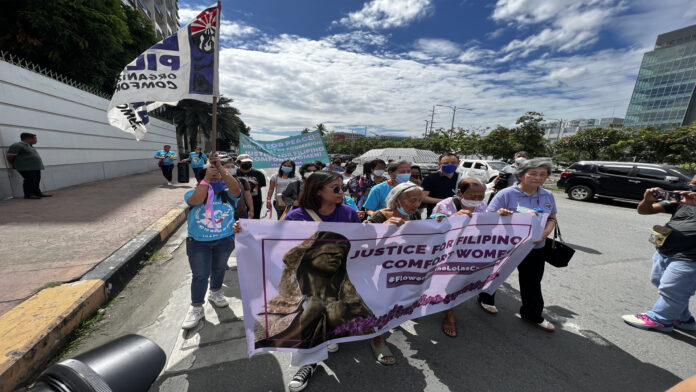President Ferdinand R. Marcos Jr. has directed concerned government agencies to respond to the needs of Filipino women who suffered sexual slavery in the hands of the Japanese Imperial Army during World War II, as he emphasized his administration’s strong commitment to women empowerment, gender equality, and the creation of a “compassionate and inclusive society.”
In a statement issued late Friday night, Marcos guaranteed that the government is taking appropriate actions on the appeal of 24 Filipina members of the non-profit organization Malaya Lolas for full reparation, social support, and recognition of sexual slavery survivors.
“I have instructed the relevant government agencies to look into how we can appropriately address the concerns of the Malaya Lolas,” he said. “The Philippine government is undertaking actions on the Views of the United Nations Convention on the Elimination of Discrimination Against Women (CEDAW) on the case of the Malaya Lolas.”
Marcos’ statement was in response to CEDAW’s March 8 decision requesting the Philippine government to grant the victims “full reparation, including material compensation and an official apology, for the continuing discrimination.”
The Malaya Lolas was forced to bring its cases before the CEDAW in 2019 after the Philippine government’s supposed failure to act on their repeated appeals to support their claims against Japan.
The CEDAW noted that the group wants to establish the Philippine government’s responsibility to fulfill its commitments under the Convention on the Elimination of All Forms of Discrimination Against Women in supporting the non-discrimination of women and girls in its territory.
The Philippine government strongly upholds the primacy of human rights and values the well-being of all Filipino women and girls, Marcos said, adding that it is also pushing for gender equality as inscribed in the country’s national laws, treaty obligations, especially under CEDAW and other international human rights instruments.
“Government agencies concerned are formulating a comprehensive response to the CEDAW Committee and will submit this within the required period,” he said. “We commit to undertaking measures and finding ways to help them live better lives as an expression of our continued deep solidarity with them and of our utmost respect.”
The President assured that his administration honors the sexual slavery victims’ “indomitable spirit and dignity in taking this important cause forward through these years.”
“While we maintain our previous position on the admissibility and merits of the case in view of national jurisprudence and treaty obligations, we recognize the grave atrocities endured by brave Filipino women during the wars of the 20th century, and sincerely commiserate with them as they bear the long-term and irreversible physical and psychological effects of the war,” he said.
Malacañang earlier said the Marcos administration would study the views of the UN women’s rights committee and submit a written response within six months, as provided for under the Optional Protocol to the CEDAW.
During World War II, thousands of women across Asia, including the Philippines, became victims of sexual slavery by the Japanese military forces.
Manila and Tokyo in 1956 signed a reparation agreement, requiring Japan to provide the Philippines with services and goods valued at the equivalent of USD550 million.
While their number rapidly decreases, the victims continue to seek justice and urge Japan to resolve the issue. (PNA)
Photo credit: Facebook/lilapilipina1992


